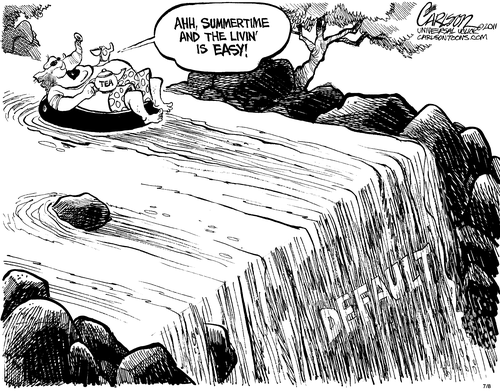“Punting the Pundits” is an Open Thread. It is a selection of editorials and opinions from around the news medium and the internet blogs. The intent is to provide a forum for your reactions and opinions, not just to the opinions presented, but to what ever you find important.
Thanks to ek hornbeck, click on the link and you can access all the past “Punting the Pundits”.
Paul Krugman: What Obama Wants

On Thursday, President Obama met with Republicans to discuss a debt deal. We don’t know exactly what was proposed, but news reports before the meeting suggested that Mr. Obama is offering huge spending cuts, possibly including cuts to Social Security and an end to Medicare’s status as a program available in full to all Americans, regardless of income.
Obviously, the details matter a lot, but progressives, and Democrats in general, are understandably very worried. Should they be? In a word, yes.
Now, this might just be theater: Mr. Obama may be pulling an anti-Corleone, making Republicans an offer they can’t accept. The reports say that the Obama plan also involves significant new revenues, a notion that remains anathema to the Republican base. So the goal may be to paint the G.O.P. into a corner, making Republicans look like intransigent extremists – which they are.
But let’s be frank. It’s getting harder and harder to trust Mr. Obama’s motives in the budget fight, given the way his economic rhetoric has veered to the right. In fact, if all you did was listen to his speeches, you might conclude that he basically shares the G.O.P.’s diagnosis of what ails our economy and what should be done to fix it. And maybe that’s not a false impression; maybe it’s the simple truth.
Lawrence H. Tribe: A Ceiling We Can’t Wish Away
ON May 16, the United States hit its legal debt limit of $14.3 trillion. Unless that limit is raised, the Treasury will, on Aug. 2, be unable to pay its bills. It will then have to either stop spending money on government programs, or default on paying the nation’s creditors.
The White House and Congressional Republicans agree in principle that the debt ceiling needs to be raised, but they are at an impasse on how to constrain the deficit’s rapid growth. Meanwhile, some people have theorized that there’s a way to get around the debt limit.
Several law professors and senators, and even Treasury Secretary Timothy F. Geithner, have suggested that section 4 of the 14th Amendment, known as the public debt clause, might provide a silver bullet. This provision states that “the validity of the public debt of the United States, authorized by law … shall not be questioned.” They argue that the public debt clause is sufficient to nullify the ceiling – or can be used to permit the president to borrow money without regard to the ceiling.
Both approaches provide the false hope of a legal answer that obviates the need for a real solution.
Carl Gibson:
Tax the Rich, Problem Solved
What if there was a group of terrorists holding your family hostage with a gun pointed at themselves, demanding the account number to your pension fund? Would you negotiate with the terrorists by allowing them access to your savings, or would you let them shoot themselves and keep your retirement money intact?
Congressional Republicans are threatening to default on the debt unless President Obama caves to their demands to cut Medicare, Medicaid and Social Security spending. Regardless of the market-crashing consequences of a debt default, actually doing so would be unconstitutional. Section 4 of the 14th Amendment clearly states that “The validity of the public debt of the United States, authorized by law, including debts incurred for payment of pensions…shall not be questioned.” Republicans are violating the constitution by threatening a debt default. End of discussion.
Eugene Robinson: A little more revenue could go a long way A little more revenue could go a long way
Do progressives care about reducing the national debt? Of course they do, no matter what the White House might believe.
“We think that obviously there are some Democrats who don’t feel as strongly about deficit reduction as [President Obama] does,” senior adviser David Plouffe said Wednesday at a breakfast with reporters and columnists. But that’s not obvious at all. It isn’t even true.
There’s no dispute about where we need to go. The question is what path to take.
Clearly, the federal government cannot continue spending at a rate of 25 percent of gross domestic product while taking in revenue that equals less than 15 percent of GDP, as is the case this year. We would reach the point where debt service crowds out health care, education and other priorities dear to progressives’ hearts. Major investments the nation desperately needs to make – for infrastructure and energy research, for example – would be impossible. Decline would be inevitable.
The way to avoid this dystopian future is to bring spending and revenue more into balance. Yes, there will be some pain and sacrifice. But it is not necessary – nor is it wise – to heap a disproportionate share of the burden onto the backs of the poor, the elderly and the battered middle class.
John Nichols: With Rupert Murdoch’s Empire in Crisis, What of Fox and His American Project?
Rupert Murdoch’s global media monolith, which includes key players in America’s right-wing media echo chamber, Fox News channel, the New York Post and the Wall Street Journal, is in meltdown.
A headline in Britain’s Independent newspaper Thursday morning cried: “Murdoch Empire in Crisis.”
Murdoch’s News Corporation announced Thursday that it would close Britain’s 2.8 million-circulation News of the World, once the highest-circulation newspaper on the planet, in response to a scandal that has exposed the sleazy practices of Murdoch’s employees. The immediate decision to close the 168-year-old newspaper came following revelations that a private investigator employed by the newspaper had allegedly hacked the cellphones of the families of British soldiers killed in Afghanistan and Iraq.
Jamelle Bouie: With Entitlements on the Table, Obama Plans to Go Big on a Budget Deal
Last night, several news outlets broke stories saying the same thing: President Obama is willing to make a deal on Social Security. Contrary to liberal hopes, this isn’t a deal to raise Social Security benefits or lower the eligibility age-a reasonable idea when unemployment is high and growth is sluggish. Instead, Obama has reportedly offered to expand the scope of spending cuts, including major changes to Social Security, Medicare and Medicaid, in return for $1 trillion in new revenue and an increase in the debt limit.
snip
In light of the size of the White House proposal and its limited palpability to members of both parties, it’s hard to see it as anything but political theater; an attempt to demonstrate President Obama’s willingness to go “big” on deficit reduction. Even still, it’s extremely disheartening; it demonstrates that, as always, Obama is willing to cater to the center-right in a huge way (entitlement cuts) for the sake of a small political advantage.
 Welcome to the Stars Hollow Health and Fitness weekly diary. It will publish on Saturday afternoon and be open for discussion about health related issues including diet, exercise, health and health care issues, as well as, tips on what you can do when there is a medical emergency. Also an opportunity to share and exchange your favorite healthy recipes.
Welcome to the Stars Hollow Health and Fitness weekly diary. It will publish on Saturday afternoon and be open for discussion about health related issues including diet, exercise, health and health care issues, as well as, tips on what you can do when there is a medical emergency. Also an opportunity to share and exchange your favorite healthy recipes. 




 On this day in 1917, Arabian troops led by
On this day in 1917, Arabian troops led by 
Recent Comments